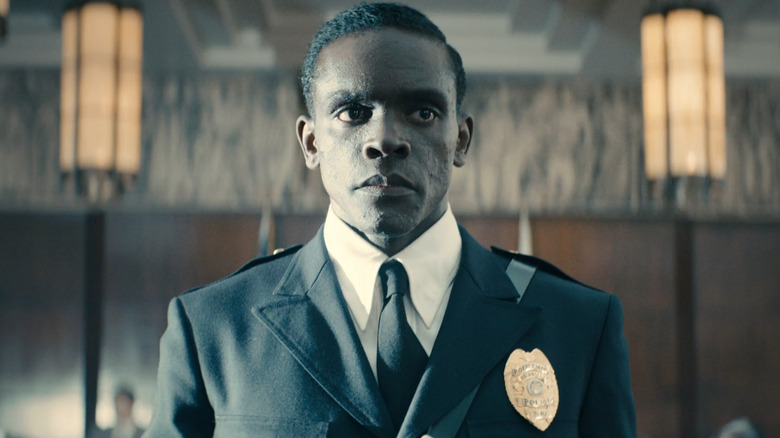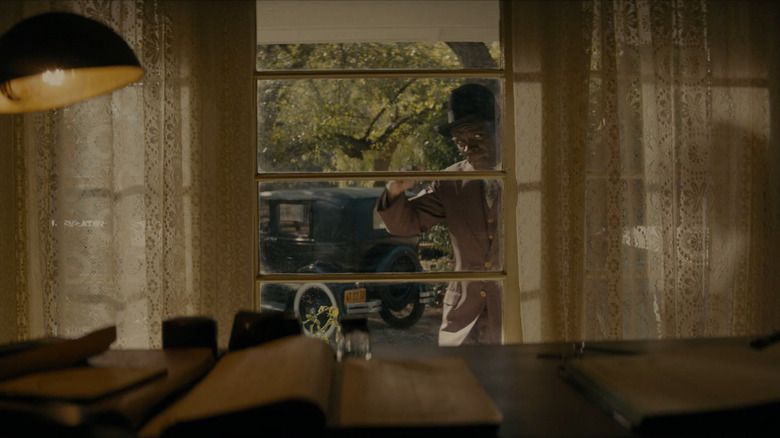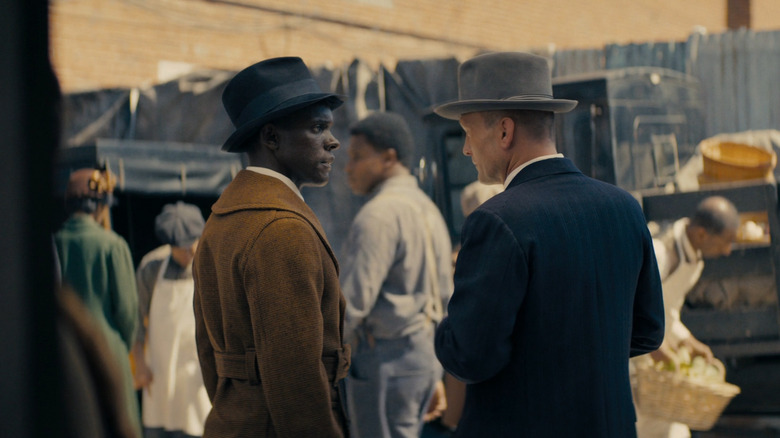Playing Perry Mason's Paul Drake Is A Double-Edged Sword For Chris Chalk
This post contains spoilers for "Perry Mason" seasons 1 and 2.
It was only a matter of time until "Perry Mason" got a gritty reboot. HBO brought the PI-turned-attorney into the streaming age in 2020, and along with him came a host of characters familiar to fans of author Erle Stanley Gardner's original books and the many TV and radio adaptations that have cropped up over the years. But one inspired change the HBO version made was to make Mason's lead investigator Paul Drake an African American LAPD officer who eventually becomes a PI.
Starting out as a uniformed street cop, by the end of the first season, Drake, played by Chris Chalk, hands in his badge and gun, quitting the LAPD in emphatic style. This sets him up to replace Shea Whigham's Pete Strickland as Mason's right-hand man. With Mason (Matthew Rhys), Drake, and former assistant Della Street (Juliet Rylance) coming together to form the new "Mason & Associates" practice, season 1 seemed to perfectly set up a second, despite the show initially being treated as a limited series.
Thankfully, HBO renewed "Perry Mason" for a second season, which arrived in March 2023. Picking up around six months after the end of the first eight episodes, things quickly ramp up for Mason and his newly-formed group when a new case emerges. This season, HBO's gritty reboot version of "Perry Mason" has already delved into some heavy subject matter, exploring the pervasive systemic racism of 1930s Los Angeles as Mason decides to take on the case of two Mexican kids accused of murdering the son of a wealthy businessman. And things get similarly heavy for Drake himself, who grapples with the pressure of providing for his new baby, and the general widespread racist attitudes of the time.
'A wonderful exhaustion'
Matthew Rhys might consider his role an easy one to play — mostly due to the excellent writing — but things aren't quite the same for Chris Chalk. The actor faced a tough challenge playing a principled and moral man trying to do the right thing in a society that's intent upon forcing him into an outsider role. By the fifth episode of season 2, Paul Drake is deeply conflicted, having been forced to beat a low-level gangster for information even after he's given up what Drake needs. He eventually returns home only to ask his wife whether he's "good" — conveying his inner turmoil and uncertainty about who he is.
And for Chalk, playing this kind of deeply conflicted character who's constantly coming to terms with who he is as a man was a bit of a double-edged sword. Speaking to Collider, the actor said:
"It was delicious and exhausting for Paul to always be at the edge and at his limit and confused. It was a wonderful exhaustion, but I definitely went home, all the time, like, 'Oh, my God, I've gotta go back tomorrow and be lost some more?' So, it was delicious. We're always grateful, as actors, to receive something that's so well-rounded. And then, there are the consequences you've gotta deal with."
Having to portray such an intensely emotional journey day to day must have been a lot to take on for Chalk, who told the New York Times he enjoys playing characters with this kind of depth and internal conflict, adding, "The stuff I've done has largely been surrounding trauma. I do enjoy doing that. But it might be time to do 'Sesame Street.'"
Chalk seeks out the tough roles
Chris Chalk is clearly well-liked, as evidenced by the New York Times piece that features multiple colleagues talking about how great it is to work with him. But there's also an intensity to the Asheville, N.C. native that allows him to not only convincingly portray the "dark and complicated" roles he told the Times he loves, but propels him to have tough conversations with writers and directors to make sure scripts are as sharp as they need to be.
In that sense, much of the exhaustion Chalk experiences is a result of him seeking out that kind of role. As he told The Wrap:
"I know that I wanted to see who Paul is when he has no control. Because he was in such control and he was on the right side of justice the whole first season [...] But who is he when it gets a little hairier and a little fishier? I think one of the questions I asked [Director/Executive Producer] Tim Van Patton, I said, 'Yeah this is cool that Perry's helping now but who is Perry when it's an all-black case?' And that was a conversation we had started at the end of the first season of just making sure we remember that the 1930s wasn't nice, it wasn't kind. The unconsciousness there was to be a racist and to not be a racist there is an anomaly."
Much like Paul Drake, Chalk's own inner sense of morality and justice seems to push him to ensure history is being depicted accurately and unflinchingly. Which is a noble thing to pursue, even if it does require some serious endurance to portray day-to-day.


